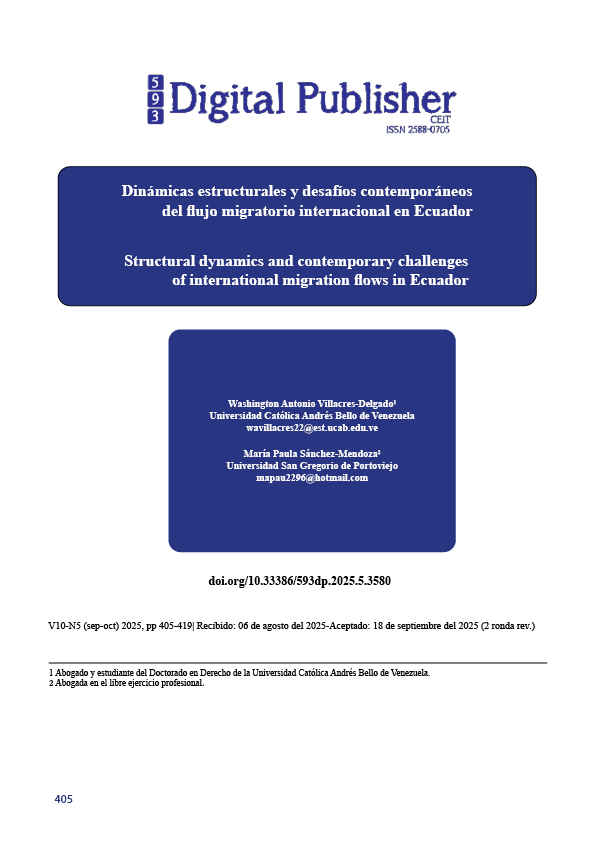Dinámicas estructurales y desafíos contemporáneos del flujo migratorio internacional en Ecuador
Contenido principal del artículo
Resumen
Durante las últimas décadas, Ecuador ha experimentado una transformación profunda en su rol dentro de los flujos migratorios internacionales, pasando de ser tradicionalmente un país emisor a convertirse en un destino receptor de migración, especialmente proveniente de Venezuela, Colombia y Cuba. Este giro responde a factores estructurales como la dolarización, la estabilidad relativa del país y las crisis regionales. En este contexto, el presente estudio tuvo como objetivo analizar las dinámicas estructurales y los desafíos contemporáneos del flujo migratorio internacional en Ecuador. Se desarrolló una investigación de tipo cualitativo, de nivel descriptivo-explicativo y diseño documental, basada en el análisis de contenido de fuentes académicas, normativas y reportes institucionales. Se emplearon técnicas de codificación temática y categorización inductiva, con criterios de inclusión y exclusión previamente establecidos. Los resultados muestran que, aunque Ecuador dispone de un marco legal garantista como la Constitución de 2008 y la Ley Orgánica de Movilidad Humana de 2017, persisten brechas significativas en su implementación. También se identificaron desafíos en la integración social, como la discriminación, la exclusión en servicios públicos y la fragmentación institucional, así como impactos económicos positivos y tensiones socioculturales emergentes. Se concluye que el país enfrenta una tensión estructural entre el reconocimiento formal de derechos y su aplicación efectiva, lo cual requiere un fortalecimiento de la gobernanza migratoria y nuevas estrategias de integración socioeconómica.
Descargas
Detalles del artículo

Esta obra está bajo una licencia internacional Creative Commons Atribución-NoComercial-CompartirIgual 4.0.
1. Derechos de autor
Las obras que se publican en 593 Digital Publisher CEIT están sujetas a los siguientes términos:
1.1. 593 Digital Publisher CEIT, conserva los derechos patrimoniales (copyright) de las obras publicadas, favorece y permite la reutilización de las mismas bajo la licencia Licencia Creative Commons 4.0 de Reconocimiento-NoComercial-CompartirIgual 4.0, por lo cual se pueden copiar, usar, difundir, transmitir y exponer públicamente, siempre que:
1.1.a. Se cite la autoría y fuente original de su publicación (revista, editorial, URL).
1.1.b. No se usen para fines comerciales u onerosos.
1.1.c. Se mencione la existencia y especificaciones de esta licencia de uso.
Citas
Acosta, D., & Freier, L. F. (2018). Regional governance of migration in South America. In Handbook of Migration and Globalisation. Edward Elgar Publishing. https://doi.org/10.4337/9781785367519.00011
Adugna, G. (2018). The dynamics of transnational family relations and remittance flow in Ethiopia. Population, Space and Place, 24(5). https://doi.org/10.1002/psp.2126
Bakewell, O. (2010). Some Reflections on Structure and Agency in Migration Theory. Journal of Ethnic and Migration Studies, 36(10), 1689–1708. https://doi.org/10.1080/1369183X.2010.489382
Bertoli, S., Fernández-Huertas Moraga, J., & Ortega, F. (2011). Immigration Policies and the Ecuadorian Exodus. The World Bank Economic Review, 25(1), 57–76. https://doi.org/10.1093/wber/lhr004
Beyers, C., & Nicholls, E. (2020). Government through Inaction: The Venezuelan Migratory Crisis in Ecuador. Journal of Latin American Studies, 52(3), 633–657. https://doi.org/10.1017/S0022216X20000607
Boccagni, P. (2011). Migrants’ social protection as a transnational process: public policies and emigrant initiative in the case of Ecuador. International Journal of Social Welfare, 20(3), 318–325. https://doi.org/10.1111/j.1468-2397.2010.00747.x
Brumat, L., & Castillo Jara, S. (2025). EU-Latin America Relations: Analyzing the Dynamics of Bi-regional Migration Governance. In The Palgrave Handbook of EU-Latin American Relations (pp. 535–553). Springer Nature Switzerland. https://doi.org/10.1007/978-3-031-80216-4_28
Burgess, K. (2014). Unpacking the Diaspora Channel in New Democracies: When Do Migrants Act Politically Back Home? Studies in Comparative International Development, 49(1), 13–43. https://doi.org/10.1007/s12116-014-9151-5
Burgess, K., & Corrales, J. (2024). Petro-states, oil shocks, and regime change: Venezuela and Ecuador, 2013–2023. Environment and Security, 2(3), 474–498. https://doi.org/10.1177/27538796241237287
Cabieses, B., Velázquez, B., Blukacz, A., Farante, S., Bojórquez, I., & Mezones-Holguín, E. (2024). Intersections between gender approaches, migration and health in Latin America and the Caribbean: a discussion based on a scoping review. The Lancet Regional Health - Americas, 40, 100538. https://doi.org/10.1016/j.lana.2023.100538
Calle Arcentales, D. E., Mero Zambrano, M. F., & Luján Johnson, G. L. (2025). Asignación presupuestaria orientada a la gestión de riesgos en hospitales públicos: una revisión conceptual. Revista Vive, 8(23), 675–695. https://doi.org/10.33996/revistavive.v8i23.405
Casas-Cortes, M., Cobarrubias, S., De Genova, N., Garelli, G., Grappi, G., Heller, C., Hess, S., Kasparek, B., Mezzadra, S., Neilson, B., Peano, I., Pezzani, L., Pickles, J., Rahola, F., Riedner, L., Scheel, S., & Tazzioli, M. (2015). New Keywords: Migration and Borders. Cultural Studies, 29(1), 55–87. https://doi.org/10.1080/09502386.2014.891630
Castles, S. (2010). Understanding Global Migration: A Social Transformation Perspective. Journal of Ethnic and Migration Studies, 36(10), 1565–1586. https://doi.org/10.1080/1369183X.2010.489381
Castro, A., Hernández, C., & Herrera, W. (2013). Migración y Estado en la Región Andina. Editorial CÓDICE LTDA. https://www.researchgate.net/profile/Alexandra-Castro-6/publication/342383820_Migracion_y_Estado_en_la_Region_Andina/links/5ef1f21692851ce9e7fce92e/Migracion-y-Estado-en-la-Region-Andina.pdf?__cf_chl_tk=OjSxhVXcyedyLpXTi8MUiWOBPRVmnXlmYUSK6lJRZFQ-1752727831-1.0.1.1-TT54iMshr1hJCjNLuh0P_GZFE55eJ9ErsrvhopLFgEU
Chalen Moreano, F. J., Tapia Segura, S. G., Bastidas Aráuz, M. B., Garcés Hernandez, B., & Yanez Tapia, R. A. (2015). The Food Culture of Venezuelan Immigrants in Riobamba: An Analysis of the Preservation and Evolution of Gastronomic Traditions in a Context of Migration. Polo Del Conocimiento, 10(7). https://polodelconocimiento.com/ojs/index.php/es/article/view/9935
Chimbo Chuquitarco, J. I., & Cortés Moya, M. I. (2023). Movilidad humana y la naturalización de migrantes en el Ecuador. Código Científico Revista de Investigación, 4(1), 140–166. https://doi.org/10.55813/gaea/ccri/v4/n1/113
Constitución de La República Del Ecuador, Registro Oficial 449 (2008). https://www.accionecologica.org/wp-content/uploads/ley_minera_registro_oficial.pdf
Cornia, G. A. (2011). Income Distribution under Latin America’s New Left Regimes. In R. van der Hoeven (Ed.), Employment, Inequality and Globalization (p. 30). Routledge. https://doi.org/10.4324/9781315874821
Cruces, G., Fajardo, J., Hernández, P., Ibáñez, A. M., Luzes, M., Meléndez, M., Muñoz, F., Rodríguez Guillén, L., & Tenjo, L. (2023). A Better World for Migrants in Latin America and the Caribbean. Inter-American Development Bank. https://doi.org/10.18235/0004850
Desarrollo Social de la Comisión Económica para América Latina y el Caribe (CEPAL). (2018). Migración internacional e inclusión en Amética Latina. Análisis en los países de destino mediante encuestas de hogares. Publicación de las Naciones Unidas. https://repositorio.cepal.org/server/api/core/bitstreams/671d1161-42ab-4942-9e50-69660286f75e/content
DG-ECHO – AECID. (2024). Mecanismos regionales de coordinación interagencial en respuesta a los movimientos mixtos en la región de América Latina y el Caribe. https://alnap.cdn.ngo/media/documents/Mapeo-mecanismos-de-coordinacion-IECAH.pdf
Di Stasi, A., Caracciolo, I., Cellamare, G., & Gargiulo, P. (2024). International Migration and the Law. Routledge. https://doi.org/10.4324/9781003488569
Díaz-Sánchez, J. P., & Correa, H. (2024). Immigration and formal labor market participation in Ecuador: Empirical insights from a developing nation. Research in Globalization, 8, 100198. https://doi.org/10.1016/j.resglo.2024.100198
Doocy, S., Page, K. R., de la Hoz, F., Spiegel, P., & Beyrer, C. (2019). Venezuelan Migration and the Border Health Crisis in Colombia and Brazil. Journal on Migration and Human Security, 7(3), 79–91. https://doi.org/10.1177/2331502419860138
Echeverría, G. (2020). Towards a Systemic Theory of Irregular Migration. Springer International Publishing. https://doi.org/10.1007/978-3-030-40903-6
Edwards, S. (2011). Exchange-Rate Policies in Emerging Countries: Eleven Empirical Regularities From Latin America and East Asia. Open Economies Review, 22(4), 533–563. https://doi.org/10.1007/s11079-011-9206-4
Fernández-Rodríguez, N., & Célleri, D. (2024). The power of bureaucracies: Shaping migration policy paradigms in Colombia and Ecuador. Migration Studies, 12(4). https://doi.org/10.1093/migration/mnae039
Gray, C. L. (2009). Rural out-migration and smallholder agriculture in the southern Ecuadorian Andes. Population and Environment, 30(4–5), 193–217. https://doi.org/10.1007/s11111-009-0081-5
Herrera, G. (2019). From Immigration to Transit Migration: Race and Gender Entanglements in New Migration to Ecuador. In New Migration Patterns in the Americas (pp. 285–315). Springer International Publishing. https://doi.org/10.1007/978-3-319-89384-6_11
Herrera, G., & Gómez, C. (2022). Introduction: Emergent Issues of South American Migrations. In Migration in South America (pp. 1–23). https://doi.org/10.1007/978-3-031-11061-0_1
Hierro, M. (2016). Latin American Migration to Spain: Main Reasons and Future Perspectives. International Migration, 54(1), 64–83. https://doi.org/10.1111/imig.12056
Jokisch, B., & Pribilsky, J. (2002). The Panic to Leave: Economic Crisis and the “New Emigration” from Ecuador. International Migration, 40(4), 75–102. https://doi.org/10.1111/1468-2435.00206
Korovkin, T. (2008). The Colombian War and “Invisible” Refugees in Ecuador. Peace Review, 20(3), 321–329. https://doi.org/10.1080/10402650802330154
La Ley Orgánica de Movilidad Humana de Ecuador. Registro Oficial Suplemento N. 938., Registro Oficial Suplemento N. 938. (2017). https://www.acnur.org/fileadmin/Documentos/BDL/2017/10973.pdf
Leonova, O. G. (2022). The Concept of “Political Globalization” and Global Challenges. In Philosophical Aspects of Globalization: A Multidisciplinary Inquiry (pp. 163–177). BRILL. https://doi.org/10.1163/9789004516007_012
Loucky, J. (2024). Sociología de las migraciones. Perspectiva iberoamericana (Á. L. Torres Toukoumidis, J. M. Pallo Chiguano, & J. Carmona, Eds.). spue. https://doi.org/10.17163/abyaups.55
Malacalza, B. (2020). Variaciones de las políticas de cooperación Sur-Sur en América Latina. Estudios de casos. Documentos de Trabajo. https://doi.org/10.33960/issn-e.1885-9119.DT32
Malo, G. (2022). Between liberal legislation and preventive political practice: Ecuador’s political reactions to Venezuelan forced migration. International Migration, 60(1), 92–112. https://doi.org/10.1111/imig.12895
Monteros, K., Dall’Orto, V., & Cempini, C. (2024). The Formation of the Urban–Rural Fringe Space in the San Cayetano Area: The Transformation of a Peripheral Urban Landscape in Ecuador. Land, 13(4), 494. https://doi.org/10.3390/land13040494
Mora, M. J., Ruiz Soto, A. G., & Selee, A. (2024). Building on Regular Pathways to Address Migration Pressures in the Americas. Migration Policy Institute. https://www.migrationpolicy.org/sites/default/files/publications/mpi-iom_regular-pathways-americas-2024-final.pdf
Moya, J., Sánchez Bautista, C., & Pugh, J. D. (2022). Contradictions and Shifts in Discourse and Application of the Refugee System in a Mixed-Migration Context: The Ecuadorian Case. In Migration in South America (pp. 121–143). https://doi.org/10.1007/978-3-031-11061-0_6
Moyano, A., Vergara, D., Mirti, A., Bonz, A. G., Monar, A., Astudillo, E., Vaca, S., Cordova, K., Armijos, A., Barroso, A., Cherrez, C., Cottle, J., DuBois, A., Capriles, I. F., Grandes, J. P., Irarrazaval, M., Jaramillo, B., Kane, J. C., Martinez-Viciana, C., … Greene, M. C. (2024). Integrating mental health and psychosocial support into economic inclusion programming for displaced families in Ecuador. Conflict and Health, 18(1), 68. https://doi.org/10.1186/s13031-024-00629-x
OIT Países Andinos. (2020). Sectores económicos con potencial para la inclusión laboral de migrantes y refugiados venezolanos en Quito y Guayaquil (Primera edición). Organización Internacional del Trabajo . https://bettateam.info/empresasrefugiados/wp-content/uploads/2022/10/Sectores-economicos-con-potencial-de-crecimiento-QUITO-GUAYAQUIL-OIT.pdf
Olivieri, S., Ortega, F., Rivadeneira, A., & Carranza, E. (2022). The Labour Market Effects of Venezuelan Migration in Ecuador. The Journal of Development Studies, 58(4), 713–729. https://doi.org/10.1080/00220388.2021.1988077
Parella, S., & Petroff, A. (2014). Migración de retorno en España: salidas de inmigrantes y programas de retorno en un contexto de crisis. Anuario CIDOB de La Inmigración, 61–88. https://www.raco.cat/index.php/AnuarioCIDOBInmigracion/article/view/288374
Pugh, J. D. (2018). Negotiating Identity and Belonging through the Invisibility Bargain: Colombian Forced Migrants in Ecuador. International Migration Review, 52(4), 978–1010. https://doi.org/10.1111/imre.12344
Pugh, J., Sulewski, D., & Moreno, J. (2017). Adapting Community Mediation for Colombian Forced Migrants in Ecuador. Conflict Resolution Quarterly, 34(4), 409–430. https://doi.org/10.1002/crq.21184
Raihan, M. M. H., Chowdhury, N., & Turin, T. C. (2023). Low Job Market Integration of Skilled Immigrants in Canada: The Implication for Social Integration and Mental Well-Being. Societies, 13(3), 75. https://doi.org/10.3390/soc13030075
Ribadeneira Sarmiento, M. E., Betancourt Meneses, S. V., Tejero Cuero, K. A., & Caisaluisa Guasgua, J. (2024). Respuesta de la sociedad civil ante la movilidad forzada: el caso de la Casa de Acogida Temporal San Antonio de Pichincha de la Fundación Nuestros Jóvenes. Revista Justicia(s), 3(1), 72–92. https://doi.org/10.47463/rj.v3i1.124
Ronquillo-Riera, O. I., Zambrano-Orvela, M. A., Arandia-Zambrano, J. C., & Robles-Zambrano, G. K. (2022). Conflictos jurídicos en el fenómeno migratorio. Derecho a migrar. Fundación Koinonía. https://doi.org/10.35381/978-980-7792-48-6
Salazar, E., Henríquez, C., Durán, G., Qüense, J., & Puente-Sotomayor, F. (2021). How to Define a New Metropolitan Area? The Case of Quito, Ecuador, and Contributions for Urban Planning. Land, 10(4), 413. https://doi.org/10.3390/land10040413
Sánchez Borja, E., & Benalcázar Alarcón, P. (2022). El despojo de los derechos en un Ecuador en reversa. Personas en movilidad humana 2017-2021. Aportes para evaluar una ley emblemática. NULLIUS: Revista de Pensamiento Crítico En El Ámbito Del Derecho. , 3(2). https://revistas.utm.edu.ec/index.php/revistanullius/article/view/4806
Serrano Córdova, C., Torres, I., & López-Cevallos, D. (2023). Exploring the impact of Ecuador’s policies on the right to health of Venezuelan migrants during the COVID-19 pandemic: a scoping review. Health Policy and Planning, 38(9), 1099–1112. https://doi.org/10.1093/heapol/czad071
Sherwood, S. G., Arce, A., & Paredes, M. (2018). Affective Labor’s ‘unruly edge’: The pagus of Carcelen’s Solidarity & Agroecology Fair in Ecuador. Journal of Rural Studies, 61, 302–313. https://doi.org/10.1016/j.jrurstud.2018.02.001
Suárez‐Navaz, L. (2012). Kichwa Migrations Across the Atlantic Border Regime: Transterritorial Practices of Identity and Rights within a Postcolonial Frame. The Journal of Latin American and Caribbean Anthropology, 17(1), 41–64. https://doi.org/10.1111/j.1935-4940.2012.01189.x
Triandafyllidou, A., Bivand Erdal, M., Marchetti, S., Raghuram, P., Sahin Mencutek, Z., Salamońska, J., Scholten, P., & Vintila, D. (2024). Rethinking Migration Studies for 2050. Journal of Immigrant & Refugee Studies, 22(1), 1–21. https://doi.org/10.1080/15562948.2023.2289116
Ubasart-González, G., & Minteguiaga, A. M. (2022). State transformations and welfare models: the significance of the return of public institutions in Ecuador of the Citizen Revolution (2007–2017). International Journal of Sociology and Social Policy, 42(1/2), 23–41. https://doi.org/10.1108/IJSSP-10-2020-0484
UNHCR. (2014). Guidelines on International Protection No. 12: Claims for refugee status related to situations of armed conflict and violence under the 1951 Convention and the 1967 Protocol. United Nations High Commissioner for Refugees.
Valtonen, K. (2016). Social Work and Migration. Routledge. https://doi.org/10.4324/9781315609669
van Noorloos, F., & Steel, G. (2016). Lifestyle migration and socio-spatial segregation in the urban(izing) landscapes of Cuenca (Ecuador) and Guanacaste (Costa Rica). Habitat International, 54, 50–57. https://doi.org/10.1016/j.habitatint.2015.08.014
Yazán Ruiz, E. A. (2024). Los derechos de los niños, niñas y adolescentes en condición de movilidad humana. LATAM Revista Latinoamericana de Ciencias Sociales y Humanidades, 5(2). https://doi.org/10.56712/latam.v5i2.1947



